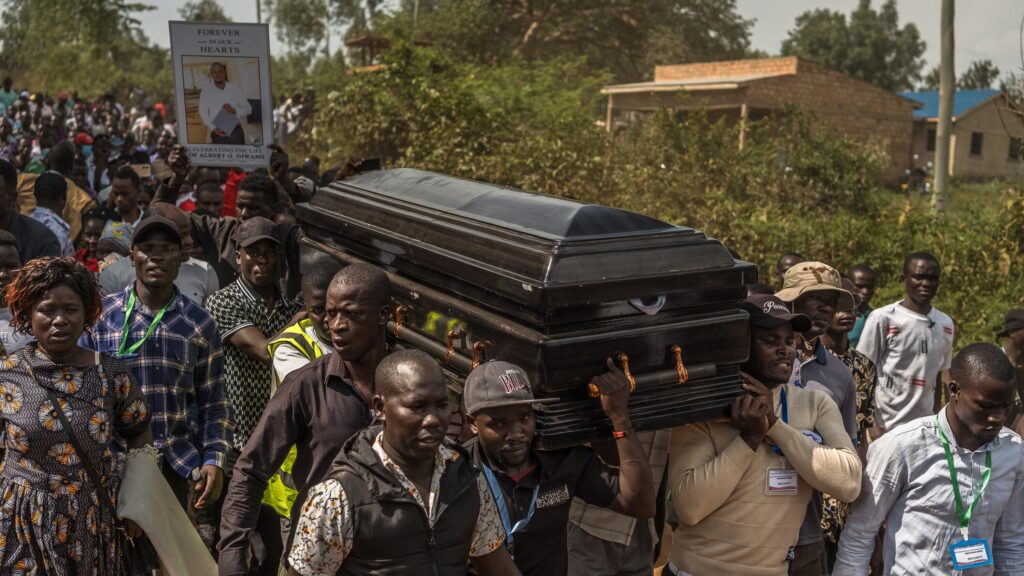In a stark reflection of escalating tensions surrounding human rights in Kenya, the death of Albert Ojwang in police detention has ignited widespread protests in the capital, Nairobi. Activists and citizens alike have taken to the streets to demand accountability and justice, reflecting growing frustrations over what many perceive as systemic abuses within the country’s law enforcement agencies. Ojwang’s untimely demise has not only raised questions about the treatment of detainees but has also amplified calls for reform amid a climate of fear and repression. As demonstrators rally to voice their concerns, the situation unfolds against a backdrop of heightened political sensitivity, setting the stage for a critical examination of Kenya’s commitment to upholding the rule of law.
Activists Demand Accountability Following Albert Ojwang’s Death in Kenyan Detention
Following the tragic death of Albert Ojwang in Kenyan detention, a wave of protests erupted in Nairobi as activists fueled by grief and anger took to the streets demanding justice. Eyewitness accounts suggest that Ojwang experienced severe mistreatment while in custody, raising concerns about the treatment of detainees within the Kenyan legal system. Protesters voiced their frustrations through chants and placards, calling for an end to impunity and demanding accountability from law enforcement agencies. Many participants emphasized the need for reform, aiming to shed light on the broader issues of human rights violations in the country.
The protests have attracted a diverse coalition of organizations and individuals united by the desire for a transparent investigation into Ojwang’s death. Activists have outlined several key demands to ensure that similar tragedies do not recur, including:
- Immediate investigation: A thorough inquiry into the circumstances surrounding Ojwang’s death.
- Police accountability: Holding officers responsible for misconduct during detainment.
- Legal reforms: Strengthening laws related to the treatment of detainees and ensuring adherence to human rights standards.
As the protests continue, there is a palpable sense of urgency among activists. They hope that public outcry will lead to significant changes within the Kenyan justice system, emphasizing that Ojwang’s death should serve as a catalyst for meaningful dialogue and reform concerning the rights of individuals in custody.
Calls for Reform Intensify as Protests Erupt in Nairobi
In response to the tragic death of Albert Ojwang while in detention, a wave of protests has surged through Nairobi, echoing the voices of citizens demanding accountability and justice. Activists, led by various human rights organizations, gathered in significant numbers outside prominent government buildings, brandishing placards with slogans such as “Justice for Albert” and “End Police Brutality.” The unrest has intensified discussions around the need for reform within the Kenyan policing system, highlighting systematic issues that have long plagued law enforcement and prison conditions.
The protesters are united in their calls for a comprehensive overhaul of policies governing detention practices. Key demands include:
- Independent Investigations: Establishment of a body to investigate deaths in custody.
- Accountability Mechanisms: Implementation of strict accountability measures for police and prison officials.
- Strengthened Legal Framework: Revisions to laws that govern the treatment of detainees to ensure alignment with international human rights standards.
As momentum builds around these issues, activists are hopeful that the current protests will not only honor Ojwang’s memory but also catalyze significant legislative change in the months to come.
Exploring the Implications of Ojwang’s Case for Human Rights in Kenya
The tragic death of Albert Ojwang in detention has ignited a wave of protests across Nairobi, drawing attention to the ongoing struggles faced by human rights activists in Kenya. This case has highlighted critical concerns regarding the treatment of detainees and sparked debates about police brutality, accountability, and the upholding of fundamental human rights. Activists have rallied, demanding that the government conduct a thorough investigation into Ojwang’s death, emphasizing that it is not an isolated incident, but rather a symptom of a larger, systemic issue affecting many detainees who find themselves vulnerable in the hands of law enforcement.
As the outcry continues, several implications emerge that could reshape the landscape of human rights in the country. Among these are:
- Urgency for Reforms: Advocates are pushing for comprehensive reforms within the police force to ensure greater transparency and accountability.
- Legal Reforms Needed: Calls for the amendment of laws concerning detention practices to prevent future abuses.
- Public Awareness: Increased activism and public discourse surrounding human rights violations could galvanize wider support for change.
| Key Organizations Involved | Focus Area |
|---|---|
| Human Rights Watch | Documentation of abuses |
| Kenya National Commission on Human Rights | Advocacy for legal reform |
| Amnesty International | International awareness campaigns |
In Conclusion
As the sun sets on Nairobi, the echoes of protests resonate through the streets, fueled by grief and a resolute demand for justice. The tragic death of Albert Ojwang in detention has unleashed a wave of outrage among activists and citizens alike, who see his case as emblematic of broader systemic issues within Kenya’s law enforcement and justice systems. As demonstrators gather, chanting for accountability and reform, the government faces increasing pressure to address the circumstances surrounding Ojwang’s death. The outcry serves as a poignant reminder of the importance of transparency and human rights in a nation striving for progress. As this story continues to unfold, the eyes of the nation—and the world—remain fixed on Nairobi, where the fight for justice and human dignity is far from over.
